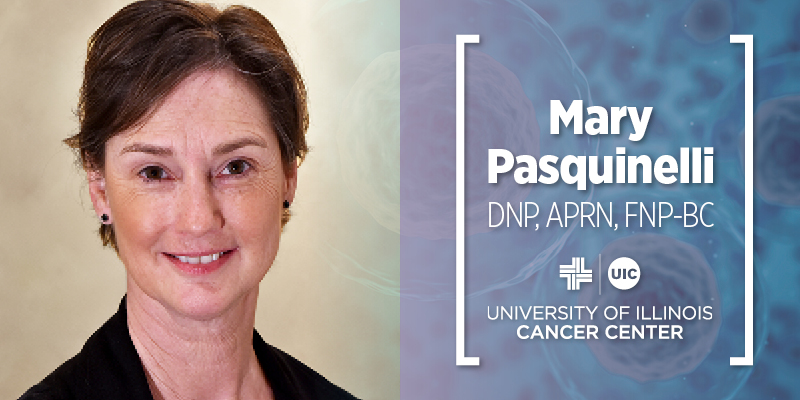
Nurse Practitioner Mary Pasquinelli, of the UI Health Lung Screening Program, received a national leadership award from the Prevent Cancer Foundation for her work building and growing the highly effective program that benefits medically underserved communities and her research on lung cancer health disparities.
A specialist in pulmonary and medical oncology, Pasquinelli, DNP, APRN, FNP-BC, CTTS, received the James L. Mulshine, MD, National Leadership Award during the Foundation’s 18th annual Prevent Cancer Quantitative Imaging Workshop. It is given annually to an individual who has had a “profound impact on reducing the toll of early thoracic disease on the health of Americans and people around the world.”
“As a nurse practitioner, this is very meaningful because many nurse practitioners are taking active leadership roles in developing lung screening and early detection programs,” Pasquinelli said. “I am honored and humbled.”
Pasquinelli has been a leader in UI Health’s Lung Screening Program since 2015. The program provides lung screening education, a lung cancer risk assessment, individual smoking cessation counseling for those who smoke cigarettes, lung screening results, and follow-up counseling. It has grown considerably over the years, “accelerating with the addition of Marisol Munoz, APRN, joining our team, hospital resources, and navigators,” she said.
“The lung cancer detection rate within the program is 2.6%, significantly higher than the national average. Of those diagnosed with lung cancer on their first screen, 65% are diagnosed at an early stage.”
Lung screening using low-radiation dose CT (LDCT) has shown to reduce lung cancer mortality by detecting the disease early, when it is more likely to be cured. Lung cancer kills more people than any other type of cancer, often because by the time symptoms occur the cancer has spread, causing late stage diagnosis. Lung cancer mortality is significantly higher in the south and west side of Chicago, Pasquinelli said.
November is Lung Cancer Awareness Month, and according to estimates by the National Cancer Institute’s Surveillance, Epidemiology, and End Results (SEER) Program, 235,760 patients in the U.S. will be diagnosed with lung and bronchus cancer in 2021, with 131,880 patients dying from the disease. Smoking is the most common cause of lung cancer.
The United States Preventative Services Task Force (USPSTF) currently recommends an annual LDCT screen for high-risk individuals who are between the ages of 50 and 80, who currently smoke or quit within the past 15 years, and have a smoking history of 20 pack-years or more (one pack per day for 20 years, or half pack per day for 40 years, or its equivalent).
Celebrating its 35th year, the Prevent Cancer Foundation is the only U.S.-based nonprofit organization solely dedicated to cancer prevention and early detection. The group’s mission is to save lives across all populations by focusing its work in four areas: research, education, outreach and advocacy.
